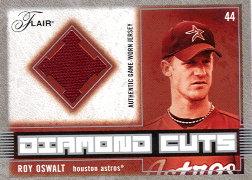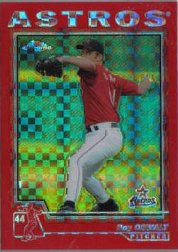| Possessor of both a mid-90's fastball, a loopy curve at least twenty miles an hour slower, and the ability to control both when on, the comparatively tiny Oswalt (only 6'0", 185) has the ability during his stretches of good health, to totally bewilder batters. His slider and changeup remain nothing special, but the slider, especially, is a pitch the man understands he needs to develop. In just six years, Oswalt went from a forgotten draft-and-follow player from a tiny Mississippi Junior College to being the cornerstone of a major league franchise. His first professional year, at Auburn in 1997, was about what you'd expect from a 23rd round draft pick, with an ERA in the 4.00's in the short-season New York-Penn League, but after that, Oswalt very quickly distinguished himself, and by 2000, he was considered one of the premier minor leaguers in the country. His 11- 4, 1.94 season for the AA Round Rock Express that year was perhaps the most stellar contribution on a remarkable championship team full of them. His selection (along with future teammate Adam Everett) to the 2000 US Olympic team was also storybook, as he put together a 1.38 ERA in Olympics competition. The Astros began Oswalt at AAA New Orleans in 2001, but quickly called him up for relief help, and by June 2, when he beat the Dodgers, retiring 18 of the 20 he faced, he was in the rotation. He finished the year 14 - 3 with a 2.73 ERA, and was named Houston's Rookie of the Year, made the Topps All-Rookie team, and was named the Sporting News Rookie Pitcher of the Year.
|
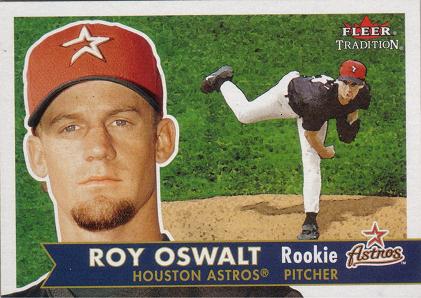
| 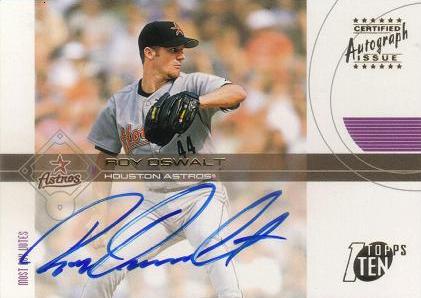
|
| 2001 Fleer Tradition # 483
| 2002 Topps Ten Autographs # TTA-RO
|
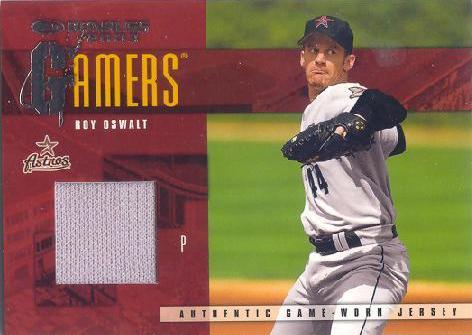
| |
| 2003 Donruss DLP Gamers # 35
| |
| If you look at the wins, Oswalt has pulled off two of the eleven best seasons in team history, as only that many have accumulated as many as the 19 wins he notched in 2002. But his seasons look even better when you factor in ERA and batting average against: |
| Year | Pitcher | Wins | ERA | Batting Avg Against | ||||||||||||||||||||
| 1999 | Mike Hampton | 22 | 2.90 | .240 | ||||||||||||||||||||
| 1979 | Joe Niekro | 21 | 3.00 | .228 | ||||||||||||||||||||
| 1999 | Jose Lima | 21 | 3.58 | .265 | ||||||||||||||||||||
| 1989 | Mike Scott | 20 | 3.10 | .212 | ||||||||||||||||||||
| 1976 | J.R. Richard | 20 | 2.75 | .212 | ||||||||||||||||||||
| 1969 | Larry Dierker | 20 | 2.33 | .214 | ||||||||||||||||||||
| 2004 | Roy Oswalt | 20 | 3.49 | .260
| 1980 | Joe Niekro | 20 | 3.55 | .270
| 2002 | Roy Oswalt | 19 | 3.01 | .247
| 1997 | Darryl Kile | 19 | 2.57 | .225
| 1998 | Shane Reynolds | 19 | 3.51 | .280 | |
| Oswalt has not been completely healthy since 2002, yet has managed to go 30 - 15 in that time. He has been tough as nails, especially in 2004 when, despite a ribcage injury that dogged him all year long, he battled through without missing a single start, and won the twenty games. Although the healthy 2002 season and 2004 are rather consistent, you can see that the batting average against has risen, as have the extra base hits; the ground ball flyball ratio has dropped, and the k/9IP have dropped slightly, as well. What I'm trying to say here is that 1) I think 2002 was a better year than 2004's 20-win season, and 2) Oswalt, if healthy, can be better even than what we've seen. Still not sure about the ribcage, but he appears to have conquered the groin, so to speak, and he's trying to integrate a slider more and more into his arsenal, which can only help. Considering that he's already won 63 games in basically 3-1/2 years, and has done so at a consistent .700 clip, and that maybe, just maybe, the injuries are behind him, it's hard not to imagine Roy Oswalt passing Joe Niekro for career wins as an Astro right around the beginning of 2010. . .
Originally posted 7/8/04, revised 3/12/05 |
